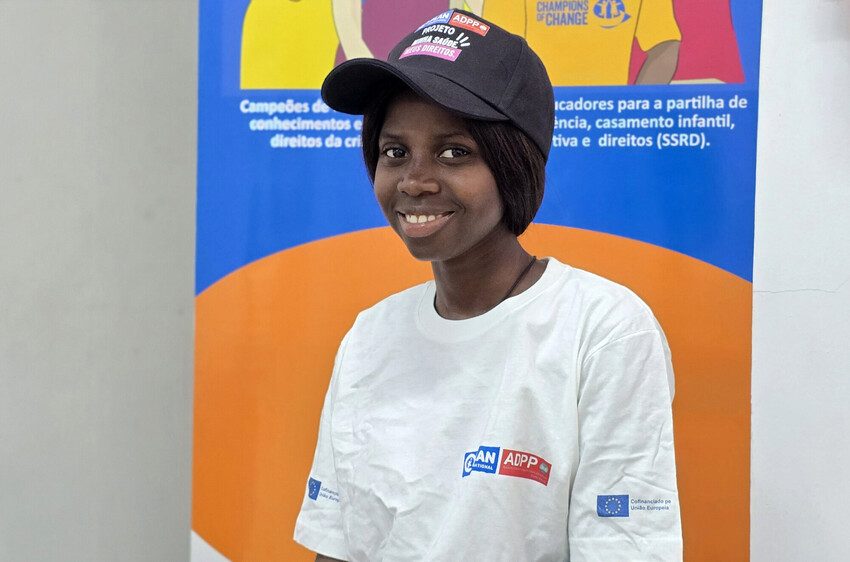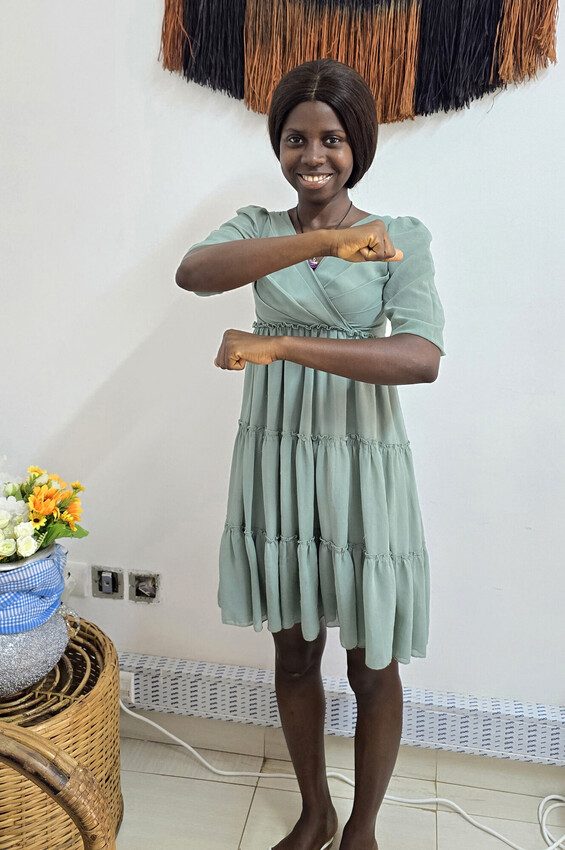Califo creates comprehensive sexuality education youth network
Medical student Califo from Guinea-Bissau helped create a youth network for the promotion of comprehensive sex education. She uses her advocacy and communication skills to increase young people's knowledge about their sexual health.

“My name is Califo, I’m 20 years old, I’m a medical student and I’m involved in a youth network set up in collaboration with Plan International.”
“Medicine is my dream course. This dream has a long history. Once I went with my father to the hospital because he has asthma. When we arrived, they made us sit down and wait to be seen. The wait was long and every time I called the doctors they said they were busy and we would have to wait. From that day on, I decided to become a doctor, not only to support my family, but also to contribute to my country. I chose paediatrics because I love children, and I wanted to work with them.”
“In our communities, parents and guardians find it difficult to talk about sex and reproductive health. It’s a taboo that they don’t talk about with their children.”
“In our society, girls get pregnant, but often without knowing how, some of them using inappropriate contraceptive methods. Our parents should know how to talk to us about this without any barriers. There needs to be more communication to teach young people how to take care of their health, for both women and men, and this will better prevent early pregnancies.”
Learning about sexual health through the youth network
“I heard about the My Health, My Rights project while I was still living at home, and I was selected to take part in a training session. We then created a network of young people called RENAPESC (National Network for the Promotion of Comprehensive Sex Education). I still attend meetings and trainings.”
“One of the aims of our network is to be a place of inclusion for young people to learn how to take care of their bodies. I think it’s important to have this group that helps young people in different regions to become more aware. The government should also contribute and help improve things, because health and education are partners that go hand in hand.”
“I’ve learnt a lot of things that I knew little or nothing about before I started going to the meetings and trainings. For example, about menstruation. It’s something I didn’t understand much, I had some explanations at school, but now with the project I know how to manage my menstrual cycle and I know the difference between the fertile period and the rest of my cycle.”
“There needs to be more communication to teach young people how to take care of their health.”
Califo
“This project helps young people a lot, especially those from rural areas, because young people from different regions are trained and then they hold awareness sessions in their own communities.”
“We young people are now able to talk to our parents and other young people about these issues and how to take better care of their bodies.”
Through the youth network and the project Califo uses her advocacy and communication skills to prevent early pregnancy and sexually transmitted diseases, and to increase young people’s knowledge about their sexual health.
The context in Guinea-Bissau
Guinea-Bissau is a country that has suffered from recurrent political instability, which has blocked the implementation of development policies and programmes. This has led to the country being classified as one of the poorest in the world, with around 65% of the population living below the poverty line. Guinea-Bissau’s young and growing population is sustained by high fertility, with around 60% of the population under the age of 25 by 2020.

In Guinea-Bissau, 26% of girls are married before their 18th birthday and 8% before their 15th birthday, often in forced marriages to men more than 10 years older. This situation generally deprives girls of educational, social and economic opportunities and puts them at greater risk of early pregnancy, not to mention obstetric complications, particularly due to poor access to quality maternal health services.
Young people generally have limited access to information on sexual and reproductive health rights. Some sex education is included in the sixth grade curriculum, but this comes too late for young people, especially girls, who often become sexually active before the age of 15. Teenage pregnancy rates are highest in sub-Saharan Africa, with around 83 births per 1,000 girls aged 15-19.
About My Health, My Rights project
Reaching young people in rural areas is an important aspect of Plan International’s My Health, My Rights project, where early marriages and teenage pregnancy rates are often higher due to the lack of comprehensive sexuality education opportunities. Once trained, the young people run awareness sessions in their own communities to share what they have learnt with others.
The project, funded by the European Union, promotes universal sexual and reproductive health and rights for adolescents in West Africa. Working in 6 countries (Guinea-Bissau, Benin, Burkina Faso, Guinea, Sierra Leone and Togo), the three-year project (July 2022-June 2025) aims to ensure that young people, especially girls and young women, have access to sexual and reproductive health services and can fully exercise their rights.
Categories: Sexual and reproductive health and rights


